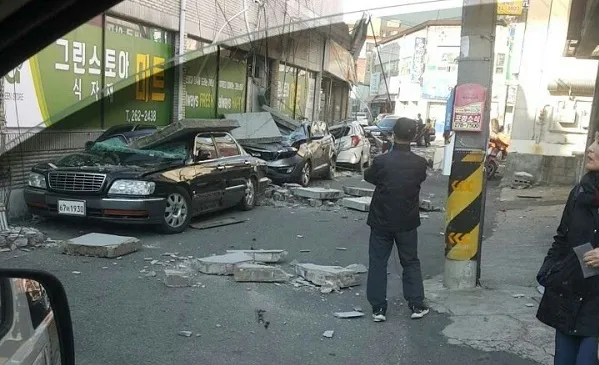
Geothermal plant 'triggered earthquake' in South Korea
The city of Pohang was rattled by a 5.4-magnitude earthquake in November 2017.
A rare earthquake in South Korea was triggered by the country's first experimental geothermal power plant, a team of government-commissioned experts said Wednesday.
The southeastern port city of Pohang was rattled by a 5.4-magnitude earthquake in November 2017 -- the second-most powerful tremor ever in the normally seismically stable South.
Dozens of people were injured and more than 1,500 left homeless -- whilst a nationwide college entrance exam was postponed in an unprecedented move as authorities scrambled with recovery efforts.
A year-long government-commissioned study pointed to the geothermal power plant as the cause.
The plant works by injecting high-pressure water deep underground to tap heat from the Earth's crust, but the process had produced micro-sized seismic activity as a result, said Lee Kang-kun, who led the research.
"And as time passed, this triggered the earthquake in Pohang," he added. "We concluded that the Pohang earthquake was a 'triggered quake'. It wasn't a natural earthquake."
Pohang residents filed a lawsuit against the government after the quake, and following the assessment, Seoul expressed its "deep regret".
The geothermal plant -- which was temporarily suspended during the study -- will be "permanently shuttered", the trade, industry and energy ministry said in a statement.
It cost around KRW80b ($71m) to build and test operations began in 2016.
Unlike neighbouring Japan, the Korean peninsula rarely experiences significant quakes but seismic activity is closely monitored as a spike can be the first indication that North Korea has staged a nuclear test.
The country's most powerful quake to date was a 5.8-magnitude tremor that struck Gyeongju, also in the southeast, in September 2016.
sh/slb/amu
© Agence France-Presse
Photo by Sphinx222 - Own work, CC BY-SA 4.0








![Cross Domain [Manu + SBR + ABF + ABR + FMCG + HBR + ]](https://cmg-qa.s3.ap-southeast-1.amazonaws.com/s3fs-public/styles/exclusive_featured_article/public/2025-01/earth-3537401_1920_4.jpg.webp?itok=WaRpTJwE)
![Cross Domain [SBR + ABR]](https://cmg-qa.s3.ap-southeast-1.amazonaws.com/s3fs-public/styles/exclusive_featured_article/public/2025-01/pexels-jahoo-867092-2_1.jpg.webp?itok=o7MUL1oO)









 Advertise
Advertise


